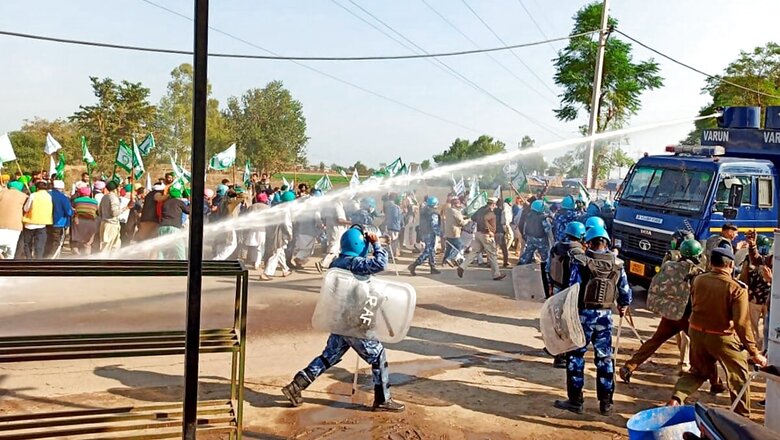
views
In an unprecedented show of unity, farmers from the north, south, west and east of India under the Samyukta Kisan Morcha, have braved severe winter, arrests, detention, house arrests and water cannons, and attempted to come knocking on the door of the Narendra Modi government in New Delhi to make themselves heard on the three latest farm laws and the proposed Electricity (Amendment) Bill, 2020, that they say, will be the death knell for them.
There is no reason to disbelieve the farmers for whether it is the over 30 organisations under the banner of the All India Kisan Sangharsh Coordination Committee (AIKSCC) or the Rakesh Tikait-led Bharatiya Kisan Union (BKU) or the RSS-affiliated Swadeshi Jagran Manch (SJM) and Kisan Sangh, all are unequivocal in their demand that the government needs to re-look at the three pieces of legislation to make it mandatory, among other things, for private players to give the minimum support price (MSP) to the farmers for their produce even outside of designated mandis in every state. The laws governing contract farming and the Essential Commodities Act also need to be revamped to make them farmer-friendly and not pro-corporates/private companies as they are in the present form.
The laws—The Farmers (Empowerment and Protection) Agreement on Price Assurance and Farm Services Act, 2020 on contract farming; the Farmers Produce Trade and Commerce (Promotion and Facilitation) Act, 2020 for private mandis; and The Essential Commodities (Amendment) Act, 2020, removing stockholding limits— brought through the ordinance route and passed in Parliament by voice vote amidst pandemonium, are all set to challenged in court for allegedly violating the federal principle, agriculture being a state subject under the Constitution.
Seeking scrapping of the three Farm Acts, the farmers’ protest on Constitution Day on November 26 had police acting against them and their leaders. Yogendra Yadav was stopped on Delhi-Jaipur Road at Rathwal Mod by Haryana Police. Activists Medha Patkar and Pratibha Shinde and their convoys of farmers and farm women were stopped on Delhi-Agra highway by Uttar Pradesh Police and later detained. Farmer leader Krishnaprasad was also held among others.
While farm leaders were prevented from reaching Delhi, union defence minister Rajnath Singh—who has often mediated on farmers’ issues—and union agriculture minister Narendra Singh Tomar have invited farmers for talks although two rounds of meetings with Punjab farmer leaders in the recent past failed to yield results.
Terming the detention of farm leaders as “unfortunate”, BKU general secretary Yudhvir Singh said they are coming to make themselves heard and that is their right in a democracy. “The government is not ready to talk and is suppressing those coming to talk,” he bemoaned, adding that the BKU was very much a part of the movement and backed all the demands.
Apprehensions that the Acts are designed in the long term to dismantle the mandi system, the Food Corporation of India and the Public Distribution System to throw farmers and consumers into the free-market system are not without basis. Without it being mandatory for private players to pay the MSP, the farmers are not assured of a price for their produce. In the recent months, farmers have got below MSP rates for maize, bajra and even wheat in the open market in several states.
“Moreover, the Acts allow the buyer to pay a month after taking delivery, which is unacceptable. There should be spot payment. Even in contract farming, the provision that farmers should be paid only after delivery of produce is not correct. They should be paid in instalments as soon as they enter into an agreement. And, there should be farmers’ courts to resolve disputes which should not end up in the sub-divisional magistrate’s court, as the law provides,” said Ashwini Mahajan of SJM.
Removal of stockholding limits under the Essential Commodities Act is another sticking point. It paves the way for international private players to dump cheap commodities in the Indian market which will hit domestic farmers. On the other hand, in times of crisis as in perishable commodities, pulses, etc, the consumers will be at the mercy of local traders known to hoard commodities for speculation. The law says that the government may invoke stockholding limits as in an emergency, then why remove limits at all is the question.
In a strong political message, three Congress-ruled states, namely Punjab, Chhattisgarh and Rajasthan, have introduced state laws to negate the three central farm laws. But since the amended state laws will also ultimately need the nod of the President of India, they are in a bind and are most likely to end up in court.
Farmers are also agitating against the proposed Electricity (Amendment) Bill, 2020, that seeks to reduce subsidies and privatise distribution of electricity with the potential of huge jacking up of per unit electricity charge. Electricity is a crucial component of farming in the use of water pumps for irrigation and doing away with concessions on this front will result in huge input costs to farmers, making agriculture further unviable and hit the government plan to double farmers’ income by 2021.
All eyes are now on the December 4 meeting with Punjab farm leaders. The government has had two rounds of talks. The first meeting was boycotted by them as only the union agriculture secretary was present. Another meeting was held with agriculture minister Narendra Singh Tomar in the presence of railway minister Piyush Goyal but the Punjab leaders came away “disappointed” as they were only handed down the “benefits” of the Acts, not heard. There was no dialogue.
However, the government would be ill-advised to extend invitation only to Punjab farm leaders for talks and, worse, to be a silent spectator to BJP-ruled states taking police action against protesting farmers and their leaders.
It must concede the demand for mandatory payment of MSP within and outside mandis and protect farmers against exploitation and unnecessary litigation under contract farming. Payment should be swift and timely looking at the fact that nearly 50 per cent farmers are indebted to either lending institutions or local moneylenders.
Eighty-five per cent of all farmers are small and marginal with landholding of less than two hectares. They cannot match the might and clout of multinational, national companies and corporate agri businesses with deep pockets.
The Prime Minister must intervene and hold meaningful dialogue with diverse farmers’ groups to redress their grievances. If need be the government must step back and amend the Acts or even withdraw them. Reforms do not mean riding roughshod over common people’s interests, in this case, the Annadata.
(Gargi Parsai, a senior journalist, based in New Delhi, was formerly with The Hindu. She can be reached on [email protected], views expressed are personal)
Read all the Latest News, Breaking News and Coronavirus News here




















Comments
0 comment